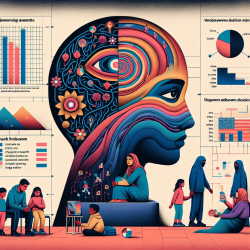Introduction
Social isolation and loneliness are increasingly recognized as significant public health concerns, particularly among migrant mothers with young children. A recent study conducted at La Maison Bleue in Montreal highlights the profound impact of these issues on migrant mothers and their children. This blog post will explore the findings of this study and offer practical insights for practitioners to enhance their skills and create better outcomes for this vulnerable population.
Understanding the Research
The study, titled Social Isolation, Loneliness and Health: A Descriptive Study of the Experiences of Migrant Mothers With Young Children (0–5 Years Old) at La Maison Bleue, provides a comprehensive analysis of the experiences of migrant mothers facing social isolation and loneliness. The research identifies several contributing factors, including migration status, socioeconomic circumstances, language barriers, and single motherhood.
The study also highlights how the COVID-19 pandemic exacerbated these issues, further limiting social opportunities for mothers and their children. The findings emphasize the need for targeted interventions at individual, community, and policy levels to address these challenges effectively.
Key Findings and Implications for Practice
- Social Isolation and Loneliness: Migrant mothers often experience a loss of family support and familiar social networks, leading to feelings of aloneness and stress. Practitioners should assess these feelings and identify contributing factors to provide appropriate support.
- Impact on Children: While the direct impact on children's health and development is less clear, reduced social opportunities can hinder their growth. Practitioners should encourage activities that promote socialization and development.
- COVID-19 Exacerbation: The pandemic intensified social isolation and loneliness, highlighting the need for flexible and accessible support systems. Practitioners should advocate for policies that improve access to childcare and social services for migrant families.
Practical Strategies for Practitioners
Based on the study's findings, practitioners can implement several strategies to support migrant mothers and their children:
- Foster a sense of belonging by creating community-oriented support systems that align with the cultural values of migrant families.
- Encourage the use of technology to maintain transnational connections, providing emotional support and reducing loneliness.
- Advocate for policy changes that improve access to affordable childcare and social services for migrant families.
- Develop interventions that address both social isolation and loneliness, focusing on building meaningful relationships and community connections.
Encouraging Further Research
While this study provides valuable insights, further research is needed to explore the long-term impacts of social isolation and loneliness on migrant families. Practitioners are encouraged to engage in ongoing research and collaboration to develop effective interventions and support systems.
Conclusion
Migrant mothers' experiences of social isolation and loneliness are intricately linked to their status as migrants and mothers. By understanding these challenges and implementing targeted interventions, practitioners can make a significant difference in the lives of migrant families. To read the original research paper, please follow this link: Social Isolation, Loneliness and Health: A Descriptive Study of the Experiences of Migrant Mothers With Young Children (0–5 Years Old) at La Maison Bleue.










